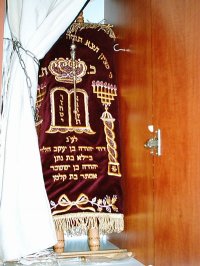[Comments in brackets are based on my observations, and are not in the Kitzur Shulchan Aruch]
On day 31 of a firstborn's life (if he was born naturally and neither parent is a Cohen or Levi) the Pidyon HaBen ceremony takes place - along with a festive meal.
The Cohen washes and says haMotzi over bread, starting the festive meal.
The father then holds the baby [bedecked in jewelry on a silver tray] and says to the Cohen:
"This is my firstborn son; he is the first issue of his mother's womb and Hashem has commanded me to redeem him as it says in the Torah: "And those who must be redeemed, from the age of a month you are to redeem... five silver Shekel of the sanctuary..." (Numbers 18:16)
He then sets the baby down [on the table] in front of the Cohen, and the Cohen asks [rhetorically]:
"What do you prefer? Your firstborn son or the 5 Shekels you need to redeem him?"
The father then answers:
"I want to redeem my son, as we are commanded in the Torah, and here is the cost of his redemption"
While still holding the money [in Israel they have specially minted silver coins with the exact weight of a Biblical Shekel] the father says the Brachot:
בָּרוּךְ אַתָּה ה' אֱ-לקֵינוּ מֶלֶךְ הָעוֹלָם, אֲשֶׁר קִדְּשָׁנוּ בְּמִצְוֹתָיו וְצִוָּנוּ עַל פִּדְיוֹן הַבֵּן
"...Who has sanctified us with His Mitzvot and commanded us regarding the redemption of a son"
בָּרוּךְ אַתָּה ה' אֱ-לקֽינוּ מֶלֶךְ הָעוֹלָם, שֶׁהֶחֱיָינוּ וְקִיְּמָנוּ וְהִגִּיעָנוּ לַזְּמַן הַזֶּה
"...Who has kept us alive, sustained us and brought us to this occasion"
The father then hands the money to the Cohen.
While waving the money over the baby's head the Cohen says:
"This is instead of that; this is in exchange for that; this is pardoned because of that. May this son enter into life, into Torah and into fear of heaven. May it be Your will that just as he was redeemed so too shall he enter into Torah learning, marriage and doing good deeds."
The Cohen then adds the following classic blessings:
יְשִׂמְךָ אֱ-לקִים כְּאֶפְרַיִם וְכִמְנַשֶּׁה
(Genesis 48:20)
יְבָרֶכְךָ ה' וְיִשְׁמְרֶךָ: יָאֵר ה' פָּנָיו אֵלֶיךָ וִיחֻנֶּךָּ: יִשָּׂא ה' פָּנָיו אֵלֶיךָ וְיָשֵׂם לְךָ שָׁלוֹם
(Numbers 6:24-26)
כִּי אֹרֶךְ יָמִים וּשְׁנוֹת חַיִּים וְשָׁלוֹם יוֹסִיפוּ לָךְ
(Proverbs 3:2)
ה' יִשְׁמָרְךָ מִכָּל רָע יִשְׁמֹר אֶת נַפְשֶׁךָ
(Psalms 127:7)
The Cohen then [hands the baby back to the father and] says the Bracha of HaGefen over a full cup of wine.
Source: Kitzur Shulchan Aruch 163:4
- Danny
Wednesday, 22 Adar-I 5779
הָאָב, מַיְיתֵי לֵהּ לַבְּכוֹר קַמֵי כֹּהֵן, וּמוֹדִיעַ לוֹ שֶׁהוּא בְּכוֹר פֶּטֶר רֶחֶם לְאִמּוֹ הַיִשְֹרָאֵלית
וּמַיְיתֵי כֶסֶף אוֹ שָׁוֶה כֶּסֶף חֲמִשָּׁה סְלָעִים וּמַנִּיחַ לִפְנֵי הַכֹּהֵן, וְאוֹמֵר לַכֹּהֵן, זֶה בְּנִי בְכוֹרִי וְכוּ', וְאַחַר כָּךְ מַנִּיחוֹ לִפְנֵי הַכֹּהֵן, וְהַכֹּהֵן שׁוֹאֵל אוֹתוֹ, בְּמַאי בָּעִית טְפֵי לִתֵּן לִי בִּנְךָ בְּכוֹרֶךָ וְכוּ'. וְהוּא מֵשִׁיב לוֹ וְאוֹמֵר, חָפֵץ אֲנִי לִפְדּוֹת אֶת בְּנִי וְכוּ'. וּבְעוֹד שֶׁהָאָב מַחֲזִיק אֶת הַמַּטְבְּעוֹת בְּיָדוֹ, קֹדֶם שֶׁיִּתְּנֵם לַכֹּהֵן, מְבָרֵךְ, אֲשֶׁר קִדְּשָׁנוּ בְּמִצְוֹתָיו וְצִוָּנוּ עַל פִּדְיוֹן הַבֵּן, וְגַם שֶׁהֶחֱיָנוּ
וְנוֹתֵן מִיָד אֶת הַמַּטְבְּעוֹת לַכֹּהֵן, וְהַכֹּהֵן נוֹטֵל אֶת הַכֶּסֶף וּמוֹלִיכוֹ בְּיָדוֹ עַל רֹאשׁ הַבֵּן, וְאוֹמֵר, זֶה תַּחַת זֶה וְכוּ'. וְאַחַר כָּךְ נוֹתֵן אֶת יָדוֹ עַל רֹאשׁ הַבֵּן וּמְבָרְכוֹ וְאוֹמֵר, יְשִׂימְךָ אֱלֹהִים וְגוֹ', יְבָרֶכְךָ ה' וְיִשְׁמְרֶךָ וְגוֹ', כִּי אֹרֶךְ יָמִים וּשְׁנוֹת חַיִּים וְגוֹ', ה' יִשְׁמָרְךָ מִכָּל רָע וְגוֹ'. וְאַחַר כָּךְ מְבָרֵךְ הַכֹּהֵן עַל כּוֹס יָיִן
וְאִם אֵין יַיִן, מְבָרֵךְ עַל שְׁאָר מַשְׁקֶה שֶׁרְגִילִין לִשְׁתּוֹת שָׁם, אֲבָל אָז צְרִיכִין לַעֲשׂוֹת הַפִּדְיוֹן קֹדֶם נְטִילַת יָדַיִם לַסְּעוּדָה, כִּי בְּתוֹךְ הַסְּעוּדָה אֵין מְבָרְכִין עַל שְׁאָר מַשְׁקִים, מַה שֶׁאֵין כֵּן כְּשֶׁיֵשׁ יַיִן, שֶׁאָז עוֹשִׂין הַפִּדְיוֹן אַחַר בִּרְכַּת הַמּוֹצִיא


